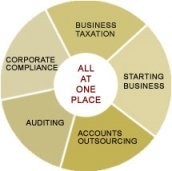An expanding economy along with complex regulations has led to a demand in the business world for expert advice. In the pecking order of finance, Chartered Accountants (CAs) rank at the top as managers, consultants, bankers and tax advisors.
Breaking in
Commerce is the most obvious stream to pursue after Class 10; however, you can also appear for the CA exam after doing science or arts. Jyoti Mhaske, accounts teacher at Smt Sulochanadevi Singhania School says, “Commerce students get a head start as a majority of the accounting basics required for CA are covered in Class 11 and Class 12.” To earn the coveted CA tag, students must pass three exams: the Common Proficiency Test (CPT), the Integrated Professional Competence Course (IPCC) and the CA Final (CAF). There is also an articleship period, which is a three-year apprenticeship with a CA firm.
Exam info
The first step is to register with the Institute of Chartered Accountants of India (ICAI) for the CPT. Once you pay the fee of R6,000 , the Institute provides study material. You can give the CPT after Class 12; it is a multiple-choice test that covers fundamental accounting, mercantile laws, general economics and quantitative aptitude— subjects that form the foundation of a CA’s career. The IPCC and CAF further test a student’s knowledge in advanced accounting, finance, taxation, audit, corporate law and information systems. Most aspirants give the CA tests alongside a regular B.Com degree, although this is not necessary. You can article with bigger firms that pro-vide great exposure but involve long hours. Smaller firms may be lesser-known, but they provide flexibility. Most firms consider applications for articleship based on academic record in the CPT and IPCC. The ICAI also helps students get placed as articles.
Prep talk
Undoubtedly, CA is an exclusive profession and demands complete dedication. Work and studies will take over your life, leaving little time for anything else. It also gets progressively tougher as you go further, unlike other courses where ‘getting in’ is winning 90% of the battle. While preparing for exams, it’s important to provision enough time for revision and weaker subjects. Considering the vast syllabus, it is tempting to leave out a few subjects. However, the ICAI has been known to throw in ‘googly’ questions from unexpected corners of the syllabus. Students must also study the practice manuals and revision test papers published by the ICAI. For the IPCC and CAF, examinees must remember to state any assumptions they make while solving problems— the ICAI will consider answers with reasonable assumptions.
“Doing the subject at a stretch can be more productive than taking up multiple topics at the same time. For theory papers, key words and concepts are more important than the length of the answers. Using acronyms can help you remember all the points”, advises Gunjan Ojha, CA Final student and 2nd Year Intern at Ernst & Young
“I observe a tendency among students to leave exam preparation to the last couple of months. This is risky since any gap can have an adverse effect considering the vast syllabus. A shaken confidence is the most common reason for failure among students. Gradual preparation and self- confidence from day one will lead to success,” says Devendra Jain, Practising CA and Direct Tax Teacher
PARTING SHOT: In the end, it comes down to doing the basic things right. Having a positive attitude and self-confidence will take you a long way. Lakshmi Shenoy, who has taught several CA students says, “Students must be ready to work extremely hard—it’s no cakewalk to have a 70-hour work week and study for 12 hours on a Sunday when your friends are out for a movie.” However, rest assured, your efforts will lead to a fruitful future in the long run.
OPPORTUNITIES
Chartered Accountants are actively recruited by top firms such as McKinsey & Co, the Boston Consulting Group, Deutsche Bank, Hindustan Unilever Ltd, Proctor & Gamble, Deloitte, KPMG etc. Students may also set up their own practice.
MONEY MATTERS
The fee for the CA course is approximately Rs 50,000 across the three levels. This includes a one-time registration amount and individual exam fees. Students earn stipend ranging from between Rs 3,000 and Rs 15,000 per month during the articleship period.
BEYOND THE CA
Depending on the career path you take post CA, you can pursue additional courses to augment your skills. Some popular options are CFA from the CFA Institute, USA, an MBA from the IIMs/ISB, a CPA from the US, LLB from a law school etc.










 CAclubindia
CAclubindia
